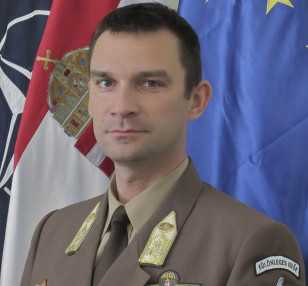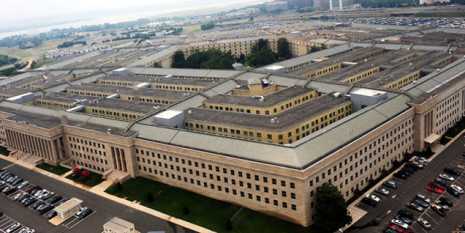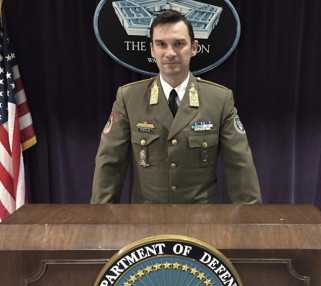„I’m Acting as a Kind of Vanguard”
Szöveg: Ádám Draveczki-Ury | 2015. augusztus 6. 9:00Col. Imre Porkoláb has been appointed to a position of special importance. The Hungarian senior officer has been working as the head of the liaison office of NATO Allied Command Transformation since early July. We interviewed him about his work and daily tasks.
Choosing a Pentagon representative for the Supreme Allied Commander Transformation (SACT) is a very complex process. All NATO member states can apply for the position, and the applicants must have, among others, excellent language and communication skills, and work experience in the ACT. The applications were considered in two phases. The selection was done personally by the SACT, and subsequently required approval from the Chairman of the US Joint Chiefs of Staff, so the process lasted for almost five months. I think that besides my personal abilities, I was chosen because the SACT has a high opinion of the contributions of the Hungarian Defence Forces to the everyday work of the Alliance. So it was also of great weight that the Minister of Defence and the Chief of Defence both supported me in submitting the application.

What are your exact tasks, authority and scope of responsibility in this position? What is your sphere of authority as a liaison officer, and what is your space for individual initiatives?
To do my job properly, it is indispensable that I precisely know the work of the ACT, which is burdening in itself as the NATO ACT has a lot of many-sided tasks. Of these, I would like to highlight the planning and organization of NATO exercises, training and education and the planning work related to the transformation of armed forces as well as the development of partnership relations. My tasks include maintaining daily contact with the US Joint Chiefs of Staff, the Office of the Secretary of Defense (OSD) and the representatives of Washington-based research institutes. As a personal representative of the SACT, I represent the four-star NATO strategic commander and have a high degree of independence.
How much depends on the personality of a given liaison officer in this position?
My work requires initiative, since NATO and the US military are continuously renewing in the present security environment, and in this process of adaptation, the only way to harmonize the work of these two huge organizations is to look for possibilities. As head of the liaison office, I consider it very important to develop personal relations and conduct an open exchange of ideas without hiding the problems, because this is the only way to build confidence.
In view of the last some weeks, what is the reception given to you? How did the American colleagues receive you and in your experience, what is the opinion about the Hungarian Defence Forces and Hungarian soldiers in Washington?
So far my experiences are quite superficial, as I started working two weeks ago in my new position. But so far I have received a lot of help and met leading officials many times in the Pentagon, where everybody is very friendly and helpful.
I find it important to mention that although I wear a Hungarian uniform, and mine is a prestigious position because anybody I meet will get to know a Hungarian soldier in my person, I represent NATO in the Pentagon. Let me also add that the opinion about soldiers and their public recognition are very positive in the United States and so in Washington. It has already happened on countless occasions that someone saw me on the street in uniform, and walked up to me to thank me for my service. This kind of social esteem can be felt everywhere and surprisingly, many of the colleagues I have met so far have already been to Hungary or worked with Hungarian soldiers in some way. They all have very fond memories of their tourist experiences and working relations.

Could you mention some concrete cases you are working on, or some concerning which you were “thrown in at the deep end" in the last few weeks?
I could mention several cases in progress which I had to discuss with the American colleagues at the first meetings. Without intending to be exhaustive, I would mention some of them that are outstanding issues and perhaps in the focus of public attention. Among the exercises, Trident Juncture, which is to take place in October 2015, will be the largest NATO exercise in the last ten years. The ACT is just completing a nearly two-year research into the transformation of armed forces, and in view of future security challenges, is about to make proposals for the development of military capabilities that will be needed to maintain peace and security. These recommendations will soon be integrated into NATO’s force planning process. Developing a strategy about hybrid warfare is another topic which involves almost all member states today. Last but not least, as a result of the American offset strategy announced last year, called Defense Innovation Initiative, NATO is also working on an innovation strategy aimed at harmonizing the development concepts of member states. In addition, I would like to highlight the preparations for the Warsaw NATO Summit, because almost every process of work that ACT is doing is somehow connected with the issues to be discussed by the heads of states at the Summit. It is certain that NATO now has an opportunity of historic significance. The adaptation process of NATO has been going on for 66 years now, but three areas deserve attention in relation with the Warsaw Summit. The first is a common understanding of the dangers of hybrid warfare and preparation for averting them, the second is the utilization of the effects of changes occurring due to the progress of technology, and the third is the further development and acceleration of decision-making processes.
What is your average workday in Washington like? Who do you have to liaise and maintain contact with?
I have daily discussions with the representatives of the above-mentioned organizations. The workday usually starts at 7 a. m. and lasts until 6 p. m. After 7 p. m. only those are allowed to stay in the Pentagon who have urgent work to do that cannot be postponed. I myself can draw up my daily schedule so I have very different tasks. I have to liaise with representatives of Pentagon-based organizations, and to travel in Washington several times when I have meetings with the representatives of research institutes. I have to regularly return to ACT personally, because as I have said, maintaining personal contacts is very important, and the SACT expects me to report to him on certain topics on a monthly basis at least. Additionally, I keep contact with the other Hungarian NATO officers who are delegated to Norfolk and work at the ACT, especially with the national representative and the staff of the Embassy of Hungary in Washington. Moreover, I am in phone contact with the leaders of the commands subordinated to ACT, the Centres of Excellence and the office of the Hungarian delegation to NATO in Brussels. Besides work, I place emphasis on health too, and take the sports opportunities provided by the Pentagon at least three times per week. It is good to go out of the office, because like most offices in the Pentagon, it is a windowless room with neon lighting. Security is another interesting issue. It was not easy at all to obtain permission to enter the Pentagon, mobile phones do not operate inside the Pentagon building, and it is generally felt that security is of the highest importance.

What do you expect from this position, what are the professional and personal aims you have set yourself for the next three years?
It is certain that I can build a very extensive system of relations in the next three years, and have first-hand access to a lot of information which can be very useful for experts on NATO or the US military and defence sector. Moreover, as a result of maintaining contact with research institutes, I will have an insight into the latest research results and have a perspective on current issues in security policy. I would like to share this information so that apart from the NATO ACT, it can be accessible to the widest possible range of experts in Hungary. I also hope that I will be able to further develop my leadership skills in this position, and would like to take the opportunity to advertise a bit and announce that HVG will publish my book in September with the title “Serve So You Can Lead", which introduces an unconventional leadership style. Like in all my former workplaces, my philosophy here is to make sure that things are in a little better state when I leave than they were when I took them over. In my current position, I hope to be able to achieve this goal. The SACT has great expectations about me, and intends to enhance NATO’s visibility through the liaison office in the Pentagon, to attract more attention to the contributions of the member states to operations carried out jointly with the United States, and to continuously develop transatlantic relations. The ACT is the only NATO command in the United States, and the liaison office in the Pentagon is the only ACT organization that represents the interest and work of the Alliance. Therefore, I’m acting as a kind of vanguard with a serious and responsible mission.